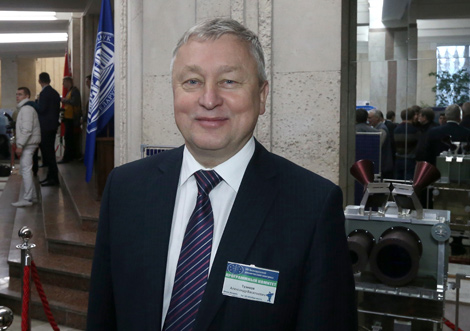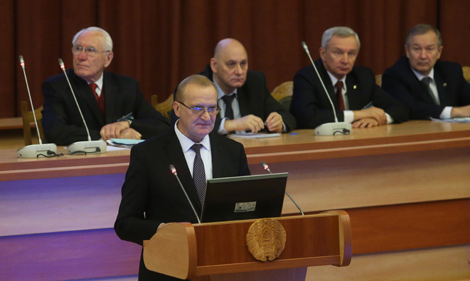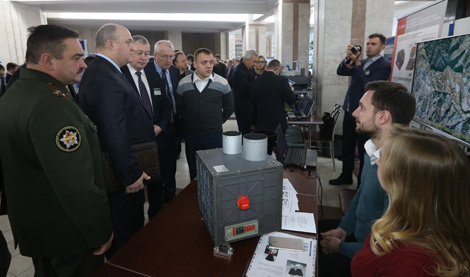Business news
Equipment for all-weather satellites in development in Belarus
 MINSK, 24 October (BelTA) – Equipment for all-weather Earth remote-sensing satellites is in development in Belarus, Alexander Tuzikov, Director General of the United Institute of Informatics Problems of the National Academy of Sciences of Belarus (NASB) told the media at the seventh Belarusian Space Congress on 24 October, BelTA has learned.
MINSK, 24 October (BelTA) – Equipment for all-weather Earth remote-sensing satellites is in development in Belarus, Alexander Tuzikov, Director General of the United Institute of Informatics Problems of the National Academy of Sciences of Belarus (NASB) told the media at the seventh Belarusian Space Congress on 24 October, BelTA has learned.
“An exhibition of space technologies is open during the congress. It displays solutions making part of the Union State program Monitoring-SG. The exhibition features interesting devices developed by Belarusian specialists, for instance, the main elements of the phased array antenna, an essential element of the all-weather satellite. The current Belarusian satellite is operating in the optical spectrum. This is why sometimes an area cannot be seen from space because of clouds. On the other hand, all-weather satellites can collect data in all weathers," Alexander Tuzikov said.
The exhibition also showcases calibration equipment developed by Belarusian State University and technologies processing Earth remote-sensing data for different economic sectors, including forestry and agriculture. “Our exhibition even features a spectrometer operating at the ISS,” Alexander Tuzikov pointed out.
 Chairman of the NASB Presidium Vladimir Gusakov recalled that Minsk will host an international congress of the Association of Space Explorers in 2018. “The seventh installment of the Belarusian Space Congress which opened today has also brought together representatives of different countries, namely scientists and specialists from Belarus, Russia, Ukraine, Kazakhstan, and other countries carrying out space research.
Chairman of the NASB Presidium Vladimir Gusakov recalled that Minsk will host an international congress of the Association of Space Explorers in 2018. “The seventh installment of the Belarusian Space Congress which opened today has also brought together representatives of different countries, namely scientists and specialists from Belarus, Russia, Ukraine, Kazakhstan, and other countries carrying out space research.
 The seventh installment of the Belarusian Space Congress is taking place in Minsk from 24 to 26 October. The forum is organized by the NASB and the NASB United Institute of Informatics Problems. The forum participants will hear out over 120 reports by scientists and specialists from Belarus, Russia, Ukraine, Kazakhstan, and other countries. The congress is meant to discuss new achievements in space exploration, define top priorities in space research, and strengthen international cooperation in space exploration and the peaceful use of outer space. The plenary reports will present innovative technologies in information systems ensuring safe operation of space rockets, space equipment, and ground-based space facilities. They will also summarize the results of implementation of the Belarusian part of the Union State program Monitoring-SG and outline prospects for Belarus’ space cooperation with Russia, Ukraine, and other CIS member states. The participants are set to consider the methods of space monitoring of agricultural production in Kazakhstan and hear out some information on the impact of numerous small space vehicles and large orbital constellations on man-made pollution of the near-Earth space.
The seventh installment of the Belarusian Space Congress is taking place in Minsk from 24 to 26 October. The forum is organized by the NASB and the NASB United Institute of Informatics Problems. The forum participants will hear out over 120 reports by scientists and specialists from Belarus, Russia, Ukraine, Kazakhstan, and other countries. The congress is meant to discuss new achievements in space exploration, define top priorities in space research, and strengthen international cooperation in space exploration and the peaceful use of outer space. The plenary reports will present innovative technologies in information systems ensuring safe operation of space rockets, space equipment, and ground-based space facilities. They will also summarize the results of implementation of the Belarusian part of the Union State program Monitoring-SG and outline prospects for Belarus’ space cooperation with Russia, Ukraine, and other CIS member states. The participants are set to consider the methods of space monitoring of agricultural production in Kazakhstan and hear out some information on the impact of numerous small space vehicles and large orbital constellations on man-made pollution of the near-Earth space.







 print version
print version make home page
make home page add to bookmarks
add to bookmarks

